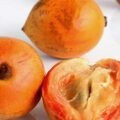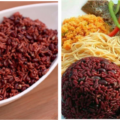Pounded yam is one of the most important foods in Nigeria. This food is made from yam, a perennial herbaceous vines cultivated for the consumption of their starchy tubers in many temperate and tropical regions, especially in Africa. With advances in technology, we don’t have to go through the stress of pounding yams using mortar and pestle due to the introduction of pounded yam instant flour commonly known as poundo yam, which is also used to prepare pounded yam. Most people love pounded yam especially when it is served with egusi and vegetable soup. In this article, we will discuss the health benefits and side effects of pounded yam.
Health Benefits of Pounded pounded yams
- Packed with nutrition
Pounded yams are rich in vitamins, minerals, and fiber.
136 grams of pounded yams provides:
- Calories: 158
- Carbs: 37 grams
- Protein: 2 grams
- Fat: 0 grams
- Fiber: 5 grams
- Vitamin C: 18% of the Daily Value (DV)
- Vitamin B5: 9% of the DV
- Manganese: 22% of the DV
- Magnesium: 6% of the DV
- Potassium: 19% of the DV
- Thiamine: 11% of the DV
- Copper: 23% of the DV
- Folate: 6% of the DV
Pounded yams are not only an excellent source of fiber but also high in potassium and manganese, which are important for supporting bone health, growth, metabolism, and heart function.
These tubers also provide decent amounts of other micronutrients, such as copper and vitamin C. Copper is vital for red blood cell production and iron absorption, while vitamin C is a strong antioxidant that can boost your immune system.
- May ease symptoms of menopause
Pounded yams may help alleviate some symptoms of menopause. In one 30-day study, 24 postmenopausal women switched from their staple food of rice to eating yams in 2 out of 3 meals (390 grams total) per day. Their blood levels of estrone and estradiol increased by 26% and 27%, respectively. Blood levels of estrone and estradiol — two estrogen hormones — typically decrease during menopause. Improving estrogen levels may ease menopause symptoms. Yet, another six-month study found that topically applied wild yam cream had very little effect on menopause symptoms, such as flushing and night sweats, compared with a placebo. Further research is needed to investigate the role that pounded yams may have in relieving menopause symptoms.
- May enhance brain function
Eating pounded yam may boost your brain. In one 12-week study, people who took a yam extract supplement scored higher on a brain function test than those in the placebo group. Pounded yams contain a unique compound called diosgenin, which has been found to promote neuron growth and enhance brain function. Diosgenin has also improved memory and learning abilities in mice in various maze tests. However, more research in this area is needed to fully understand how pounded yams may benefit brain health.
- May have cancer-fighting properties
Pounded yams provide several antioxidants that may have anticancer properties. In an animal study, a yam-rich diet significantly reduced colon tumor growth. These effects were associated with the antioxidants present in pounded yams, suggesting that these tubers may protect against cancer. What’s more, a test-tube study found that extracts from Chinese yam, specifically the peel, inhibited liver tumor growth and offered antioxidant properties. However, research is limited, and studies have yet to test these effects in humans.
- May reduce inflammation
The antioxidants in pounded yams may help reduce inflammation. Chronic inflammation is linked to an increased risk of various conditions, such as heart disease, diabetes, and obesity. Eating anti-inflammatory foods, such as pounded yams, can help manage chronic inflammation.
Several rat studies have observed that yam powder reduced inflammation related to several illnesses, including colon cancer, irritable bowel syndrome (IBS), and stomach ulcers. Still, more studies are needed to determine whether eating pounded yams has the same anti-inflammatory effects in humans.
- May improve blood sugar control
Pounded yams may improve your blood sugar levels. In one study, rats given yam powder or yam water extract experienced decreased fasting blood sugar and hemoglobin A1c (HbA1c) levels, compared with the control groups. HbA1c is a measure of long-term blood sugar control. Another study found that rats given higher amounts of purple yam extract showed reduced appetites, greater weight loss, and improved blood sugar control, compared with a control group.
Furthermore, another study in rats found that supplementing with yam flour reduced the rate of blood sugar absorption, which led to improved blood sugar control. These effects are attributed to the resistant starch and fiber in pounded yams.
Resistant starch passes through your gut undigested. This type of starch is linked to various health benefits, including decreased appetite, as well as improved blood sugar levels, and insulin sensitivity. SEE: Health Benefits and Side Effects of Eating Fufu
Other potential benefits
Pounded yams are associated with a number of other health benefits, including:
Improved digestive health: Studies indicate that the resistant starch in pounded yams may increase digestive enzymes that help break down food and increase the number of good bacteria in your gut.
Weight loss: One animal study found that yam extract reduced food intake, suggesting that these tubers may help reduce appetite and improve weight loss. The fiber in pounded yams may promote weight loss as well.
Antimicrobial effects: Though the exact mechanism is unknown, several studies observe that yam extract may protect against certain drug-resistant bacteria.
Improved cholesterol levels: In one study, women who ate 18 ounces (390 grams) of pounded yams per day for 30 days experienced a 6% decrease in blood cholesterol levels (11Trusted Source).
Though pounded yam-rich nutritional content appears to provide numerous benefits, more human research is needed to study these effects in detail.
Side Effects & Safety of Pounded Yam
Headache and Vomiting: When taken by mouth pounded yam is safe. However, when eaten in large amounts it can cause vomiting, upset stomach, and headache.
Worsening of Certain Hormone-sensitive conditions: Conditions such as breast cancer, uterine cancer, ovarian cancer, endometriosis, or uterine fibroids: Pounded yam might act like estrogen. If you have any condition that might be made worse by exposure to estrogen, do not use wild yam.
Protein S deficiency: People with protein S deficiency have an increased risk of forming clots. There is some concern that pounded yam might increase the risk of clot formation in these people because it might act like estrogen. One patient with protein S deficiency and systemic lupus erythematosus (SLE) developed a clot in the vein serving the retina in her eye 3 days after taking a combination product containing wild yam, dong quai, red clover, and black cohosh. If you have protein S deficiency, it is best to avoid using yam until more is known. SEE: Health Benefits of Semovita





